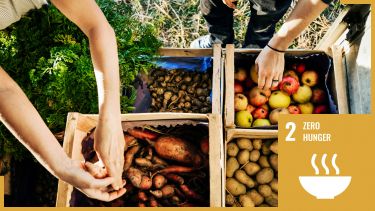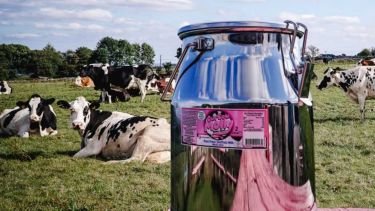SDG2: Zero Hunger
At Sheffield we are striving to support goal two both locally and globally, by increasing the access to affordable food for as many people as possible.

Key facts for how we are achieving SDG2
- All food waste from our commerical outlets and students residences is sent for anaerobically digestion. We work with student groups to redistribute edible food, meaning food waste from our outlets equates to only 920g per staff member and student per year (34.7t total in 2020/21)
- Ground breaking research and innovation at the Institute of Sustainable Food
- University and student based initiatives to reduce food insecurity
- Community fridges to help reduce food waste and ensure donations to students and the local community
- Working directly with our coffee growings in Columbia to ensure a fair price and working conditions
Across the planet there are 2 billion people who are chronically hungry. That’s over a third of the world. The COVID-19 crisis has pushed those rising rates even higher. The war in Ukraine is further disrupting global food supply chains and creating the biggest global food crisis since World War II.
At Sheffield, we are using our research expertise to help find dynamic solutions to the challenges of food security and sustainability, as well as working locally to help those facing food poverty.
Institute for Sustainable Food
Our globally recognised Institute for Sustainable Food is dedicated to producing ground breaking research and innovations to feed a growing population, whilst also protecting the natural world to promote a sustainable future.
Research and projects
Mitigating climate change with rock dust
Scientists from Leverhulme Centre for Climate Change Mitigation, who are affiliated with the Institute for Sustainable Food and Energy Institute used the University's world-class controlled environment facility to research how rock dust helps soils store carbon and boosts crop yields.
It is thought by adding rock dust to crops could contribute significantly to mitigate the climate crisis, improve food and soil security, and cut farmers’ costs.
Learn more about mitigating climate change with rock dust
Desert Garden Project
A unique project born out of innovative Sheffield science is helping families displaced by war at a Zatari refugee camp in Jordan to grow fresh food using the most unlikely of materials; discarded mattresses.
Using polyurethane foam found in old mattresses at the camp, our team of researchers have grown crops for food production in a hydroponic system. Across the camp more than 3000 refugees have been trained to use mattress foam as an alternative to soil.
Learn more about the Desert Garden Project
Local food, Covid-19 and the future of the UK's food systems
The local food sector came into focus during the Covid-19 pandemic as the UK’s mainstream food systems experienced shocks and shifts. This project examines this period and shows how we can enhance the resilience of the local food sector and of the wider food system in the UK. The pandemic not only substantiated the importance of the local food sector, it also provided an opportunity to envision a food systems transformation centred on strengthening local food systems. Research in this area can help improve levels of food security so more people can gain access to food.
Find out more about the project
Surviving climate chaos
We’re trialling mini-farms in old shipping containers, first on campus and then across the city, to grow crops on a small scale in a controlled environment. Using an aquaponics system which replaces fertilisers with fish waste, the farms will use only 10% of the water of conventional agriculture.
Urban horticulture
Academics from the Institute for Sustainable Food have found that growing fruit and vegetables in just 10% of a city’s garden and other urban green spaces could provide 15% of the local population with their ‘five a day’; the equivalent of 90,000 people in Sheffield.
Find out more about the research
Feeding the world with climate-ready rice
Scientists from the Institute for Sustainable Food at the University of Sheffield have been researching ways to help rice plants cope with a more extreme climate.
Find out more about the research
Reducing food waste
Community Fridges
Through our Community Fridge Scheme, we have donated over 40 tonnes of food that has been to be used by students and the local community.
Find out more about our Community Fridge Scheme
Save Our Sandwiches
Save Our Sandwiches is a student-led initiative to ensure edible, leftover food does not go to waste. The team of volunteers work with University catering staff to collect leftover food and redistribute it to local organisations, such at the Archer Project homeless charity.
Learn more about Save Our Sandwiches
Sustainable milk, produced in Sheffield
We’ve been working with Our Cow Molly, the last dairy farm in Sheffield that processes and bottles its own milk, since 2010.
Our Cow Molly supplies all of the University’s cafes, hotels, conferencing and catering services with fresh milk from its dairy only four miles from campus.
As a result of the agreement with the University, Our Cow Molly has been able to borrow and invest in a new state-of-the-art dairy and secure a sustainable supply of milk to the University and to Sheffield as a whole.
By purchasing locally, every penny from the milk remains in Sheffield, benefitting the local economy and community. Also, by using a local supplier the University’s carbon footprint and environmental impact is minimised.
Our partnership has been recognized nationally, supporting the industry and the campaign for sustainable dairy farming, from being featured on BBC Countryfile to winning the BBC Food & Farming Future Food Award in April 2016.
Our close partnership with Our Cow Molly continues to allow us to explore innovative ways of reducing the environmental impact of milk, such as introducing stainless steel milk churns and pumps, cutting plastic use by 87,000 bottles a year.
Learn more about the impact of the University's partnership with Our Cow Molly

